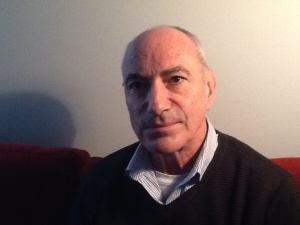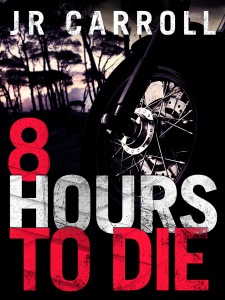The Intel: JR Carroll
 We love writers here - east, west, north and south. JR Carroll was born and raised in Melbourne, where he still lives. He worked as a teacher before turning to full-time fiction writing. His first book, about the Vietnam War, was Token Soldiers. This was followed by a series of crime thrillers, including Catspaw, No Way Back, Out of the Blue, The Clan, Cheaters, and Blindside. His latest crime novel, 8 Hours to Die, was released by Momentum last month. JR kindly gives us the Intel on his writing regime.
We love writers here - east, west, north and south. JR Carroll was born and raised in Melbourne, where he still lives. He worked as a teacher before turning to full-time fiction writing. His first book, about the Vietnam War, was Token Soldiers. This was followed by a series of crime thrillers, including Catspaw, No Way Back, Out of the Blue, The Clan, Cheaters, and Blindside. His latest crime novel, 8 Hours to Die, was released by Momentum last month. JR kindly gives us the Intel on his writing regime.
How would you describe 8 Hours To Die to a potential reader?
8 Hours to Die is a ‘siege thriller’, a well-established sub-genre in which potential victims are attacked by outlaws in their own home. This is everyone’s nightmare: how safe am I in my own house? It is a gritty, ultra-violent story in which the home invaders are ruthless killers hell-bent on breaking in and wreaking havoc, told more or less in real time, to heighten the tension.
What’s the secret to writing a gripping thriller?
I think the secret to a gripping thriller is being able to produce a plot that moves along quickly and credibly and which shocks the reader with each twist and turn. And the characters - even the bad guys - have to be fleshed out and believable; we have to be able to get inside their skins as well as those of the victims. In a way, it’s classic battle between good and evil, and the reader can never be sure which way it’s going to go until the final page. Even when it’s over, it really isn’t over ...
What’s your writing process? What comes first - plot or character?
I usually begin with a single idea, which is enough to get the ball rolling ... a particular scenario, or a character who seems to me interesting or disturbing. After that, I make it all up as I go along. This approach always involves a lot more thinking than actual writing. I like to see the ending at about the halfway point, and work steadily towards out. Sometimes I write out the last paragraph well in advance. In the case of 8 Hours to Die, the plot definitely came first.
What are the themes you always return to in your writing?
I guess every writer returns to certain themes, and I’m no different. I like the idea of events that occurred in the distant past coming back with devastating effect. An unsolved crime, a secret that won’t go away ... A character who returns after a long absence. I also like the idea of flawed heroes - or anti-heroes - as that makes for a much more complicated and interesting protagonist. My fictional world is one in which nothing is black and white.
Take us through a typical writing day for you?
I’m a late starter - maybe 10.30 or 11am, for an hour or so, then another hour in the afternoon. But as I say, I do a lot of thinking, and I can jump back on the computer any time if I come up with a good idea. I spend a lot of time trying to work out how a particular character can develop, and how I can move the plot along through a difficult patch. I’m always trying to think up ways of ratcheting up the tension.
Who are the authors or you love, and why?
I’ve always loved fiction, but when I got into the crime business I had little experience with the famous crime writers other than Raymond Chandler and Dashiell Hammett. But as time went on I got interested in Elmore Leonard, James Ellroy, James Lee Burke, Patricia Cornwell, Ruth Rendell, James Crumley, Michael Connelly, Michael Dibdin, Robert Crais. There are many more - but I suppose I owe more to contemporary American writers than anyone else. They seemed to be more visceral and stylish; a lot more of the noir qualities and the ability to place a story in a time and place that is absolutely convincing.
What’s the hardest lesson you ever had to learn about writing?
One of the hardest lessons I’ve learnt about writing is that with each novel, you have to start from scratch and invent something worthwhile out of nothing. It can be daunting, especially given that you can’t please everyone. So, with that in mind, you just have to push on and persevere with your own agenda. I’ve been rejected plenty of times early on, and I know how discouraging that can be. But if you believe in yourself enough, you’ll get there with hard work, persistence, and above all, a talent that sets you apart. I think Frederick Forsythe’s The Day of the Jackal was rejected by 27 publishers, so there’s a lesson right there!
 How do you deal with feedback?
How do you deal with feedback?
Feedback is very important, when it comes from editors or people who are involved in the business and know what they are talking about. You have to listen to feedback, including negative criticism, as no book is perfect. I have always been willing to make changes at the suggestion of an editor, even major ones. Nothing is precious in the book - I’ve cut out whole chapters, completely re-arranged the structure, deleted characters, etc, and it’s all turned out for the better. Uninformed criticism I take no notice of. The advent of the Internet has created a whole universe of online experts, some of them quite feral, so you have to be wary of that.
How have your own experiences shaped your writing?
I studied English Literature at University, was an English teacher for years, so I’m well-grounded as far as that goes. The writers who inspired me initially were Robert Penn Warren and Graham Greene, both of whom have very dark qualities to their writing ... I think the idea of crime, with a strong element of romance and escapism that is associated with, came from All The Kings Men, The Power and the Glory, Brighton Rock etc. There is something about mystery, the loner trying to right wrongs, that is bewitching and very seductive. I’d also include Colin Wilson in that - some of his psychological thrillers are absolutely superb, but he’s out of fashion now.
My own life bears no relation to the brutal world of crime fiction that I write about. Friends say, ” How in the hell can you come up with stuff like that?” because really, there’s nothing of me in those stories. It’s all fantasy.
Give me some advice about writing…
The best advice I can give about writing - crime writing - is that first, you have to read a power of books, good and bad. Get familiar with the genre you’re working in. You can’t suddenly become a successful writer in a vacuum. Read voraciously, and don’t start writing a novel until you have a damned good idea, one that will go the distance. Remember: action is character. Cut back on description, which can kill interest. Avoid purple prose. Keep the plot rolling. Try not to be a ‘stylist’ - your own style will evolve in time, if you persist. I copied F. Scott Fitzgerald and Hemingway initially, before realising that was going nowhere. Don’t do what’s been done before if you can help it. When I’m stuck, I often read great authors to get some inspiration. That can work wonders.
What’s your best advice for an author looking to get into the marketplace…
That’s the tough part. So many people are writing novels now, it’s hard to break in. If you can, get an agent. That’s not easy either. Otherwise, make sure your book is as good as you can get it, then send it to numerous publishers simultaneously. Have a short synopsis prepared, and a sample chapter if that’s what the publisher asks for. Don’t take rejection to heart. Everyone’s been rejected. If you’re good enough, you’ll get there in the end with persistence. That can take a long time. Overnight success stories are few and far between. And, as I said earlier, be prepared to make changes.
What’s next for you?
Following 8 Hours to Die, I’m currently working on a crime story about some cold murder cases involving a detective who has his own demons from the past to contend with ... he is a compromised character but utterly determined to get the job done. It’s an interesting project, and while I have a few ideas left at the half-way point, I’m not sure how it’s going to end. But then, that’s half the fun. And if it isn’t fun, why do it?

